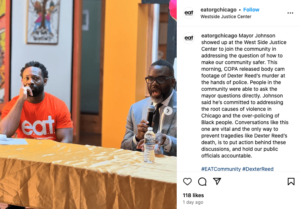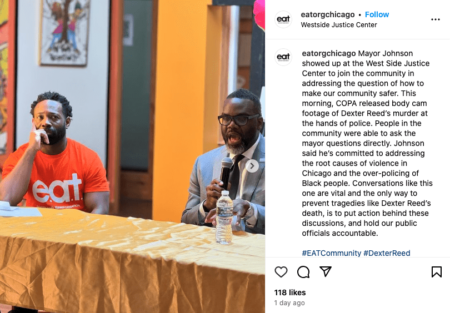- “Fasting felt necessary, mind over matter,” Sharonda Miller says.
-
Courtesy Antu’Nesha Taylor
Stretched out on her bunk at night, arms all akimbo, Sharonda Miller likes to close her eyes and imagine freedom is a train ride home. After 19 years away from her only child, the 41-year-old mother, known for her big jokes and watchful eye, has built countless friendships inside the gates of Logan Correctional Center, Illinois’s largest women’s prison.
Miller pictures the gentle “no thank yous” she will dole out to offers of car rides from those she’s met over the years. Instead, she’ll take the solitude and directness of a fast metal train car cutting through the gold and green fields taking her home, finally, after nearly two decades.
That dream will have to wait. One day at the end of May, there was water everywhere, maybe a foot deep, rushing out of shower drains and toilets, and rising in her unit. “I told my buddies who kept sweeping out the water with a broom that I thought I saw shit balls,” Miller wrote to me sardonically over an electronic message service. “Finally a large turd came up and we all looked in shock at it at the same time.” Her friends darted out of the sewage water. The unit’s gate was shut and about 40 women were locked in with noxious liquid that would destroy many personal belongings.
The women were eventually moved to vacant units that had not been used for years, one of which was “condemned” according to Miller. In these units there were no phones, no cable WiFi, and no video visits, essentially cutting off the women from communicating with their children and loved ones. Mold, spiders, and maggots were in the sinks. Miller was puzzled. Crammed together and unable to social distance, her anxiety from surviving the COVID-19 pandemic began to rise. She thought Logan Correctional Center had adequate livable space due to the reduction in its population during the pandemic.
The lack of cameras in her temporary unit made her mind tick and creep into dark parts of her past. Miller, like nearly all women at Logan Correctional Center, is a survivor of gender violence. She was sexually assaulted as a child in the foster care system and just last year, during the pandemic, she claims a correctional officer attacked and physically assaulted her, nearly breaking her arm. A 2017-2018 survey conducted by the University of Chicago School of Social Service Administration in partnership with the Women’s Justice Institute found that 99 percent of the women incarcerated at Logan Correctional Center have experienced physical, emotional, or sexual abuse at some point in their lives. More than half the respondents, 60 percent, like Miller, had experienced abuse as a child.
The next day, prison officials said they needed volunteers to clean up the old housing unit. Miller’s two friends were given watered-down bleach to clean out a room that reeked of feces. They reported back that nothing was fixed—there were still only two working toilets and sinks for more than 40 women.
Fearing what they had been exposed to in the water, Miller says the women in her unit asked for hepatitis A and B shots. Prison staff said the shots wouldn’t help after exposure and that they should have received them when they arrived to serve time. A day later, they were given a memo from prison staff that said they could ask for vaccinations, according to Miller.
Stuck in a condemned unit, Miller and two friends began to plot a way out for all the women on the tier. For nearly two decades, Miller has operated as a strategic prison organizer and an unofficial “jailhouse lawyer,” assisting hundreds of women in navigating clemency petitions, filing appeals, and deciphering legal paperwork from law libraries. She even taught women how to vote, despite never having voted herself. The three women asked a correctional officer to help; he said he would see what he could do. After hearing nothing for days, they wrote a shift commander who said he would check into it; again they didn’t hear anything. By June 4, Miller says that she and her co-organizers wrote a letter to Logan Correctional Center officials asking them to move the group to functional, clean housing. (While Miller was comfortable sharing her name on record, her co-organizers asked to not be named in this article out of fears of retribution.)
Another three days passed and repairs were still not done. On June 7, the hunger strike began. “Fasting felt necessary, mind over matter,” Miller says. “Even if death was to come, those were the chances we were willing to take.” In just two days, they ended the strike because repairs were promised and prison officials assured the group they would be moved again if needed. While new sinks were installed, Miller says that women have stuffed clothes at the base of the sinks to stop them from leaking and that mold is still visible in the unit. She says that Logan Correctional Center staff held a town hall on June 10 where staff also questioned whether it was safe for the incarcerated women to live there.
Lindsey Hess, a spokeswoman for the Illinois Department of Corrections, confirmed in an e-mailed statement that the three women went on a hunger strike in early June due to plumbing issues that began on May 29. Hess says that facility staff identified plumbing issues and a leaky pipe in the basement of housing unit seven, and out of precaution women from the unit were moved for repairs.
“If they can’t properly house inmates then they should release them,” Miller says of the facility. “The longer-term inmates get exposed to these conditions when they should be released because they have already been rehabilitated.”
Even before the sewage flood, Logan Correctional Center was quite literally falling apart, like many of Illinois’s aging prison facilities. Opponents see it as a carceral money pit. Reformers want Logan shuttered and the state to invest in more community-based carceral solutions; abolitionist organizations, like Moms United Against Violence and Incarceration, want the women housed there to be freed. No one interviewed for this story was sure what exactly the state’s long-term vision for Logan Correctional Center is.
The Lincoln, Illinois, facility, a 150-acre rust-colored brick prison, is located some 30 miles north of Springfield and houses just over 1,000 women currently, according to the Illinois Department of Corrections website. Over the past ten years, Illinois has spent $1.4 billion on its women’s prison and parole system. Logan Correctional Center alone costs the state $60 million to operate each year, which is over 70 percent of the Illinois Department of Corrections Women’s Division’s operational costs. Illinois Department of Corrections requested $24.9 million for repairs and renovations at the facility in 2022.
After nearly two decades as a men’s facility, Logan Correctional Center was “hastily converted” to a women’s prison in 2013 in “an ill-conceived plan” to consolidate the women’s prison population and in turn address the state’s budget shortfall at the time, according to a recent Women’s Justice Institute report. The facility has since fallen into deep disrepair, including mold, falling ceilings, rodent and insect infestation, and significant plumbing issues that have caused water supply shutdowns. Miller also says that birds “dip and dive overhead” while incarcerated people eat in the kitchen and fat raccoons that live in the ceilings “have gnawed through the roof making holes large enough to fall through and attack.” The plumbing has always been faulty on a major scale and there’s no air conditioning in the heat of balmy Illinois summers, she adds.
“People hear ‘prison’ and think we deserve less than human treatment as is,” says Miller. “So it’s nearly impossible to receive any type of compassion or assistance in regards to our lives and issues.”
Inspired by Mumia Abu-Jamal, Assata Shakur, Angela Davis, and the San Quentin Six, to name a few political activists, it wasn’t the group’s first time organizing. Miller participated in a commissary boycott at a federal prison in Tallahassee in 2004. One of the other strikers says she once missed 24 meals in a hunger strike before prison officials came to talk to her.
The trio of mothers are friends who bonded over the past decade in Mom and Me programs and summer camps with their kids at the now-shuttered Dwight Correctional Center.
Antu’Nesha Taylor, or “Doola,” was just four years old when Miller was sentenced to 30 years in the Illinois Department of Corrections. In 2003, a Williamson County jury convicted Miller of first-degree murder in the death of Alexander County Assistant State’s Attorney Steven Jett. Miller, who was then in her early 20s at the time, worried that Jett had HIV and broke off their sexual relationship, yet the pair remained friends.
Miller claims that Jett attacked and attempted to rape her at gunpoint in his home one night while her daughter was present, and in an attempt to defend herself she fired a shot in the dark that killed Jett. Then-Williamson County State’s Attorney Charles Garnati had asked then-Judge John Speroni to give Miller the maximum 60 years in prison. “I think you have the potential for rehabilitation and to be a productive member of society,” Judge Speroni told Miller at the time of the trial. “Of course, it is still a matter of your choice.”
Supporters argue that Miller was criminalized for defending herself against rape and punished for her act to survive gender violence. Since November 2020, her clemency petition to reduce her sentence to time served has sat on Governor J.B. Pritzker’s desk, awaiting his judgment.
All three women are required to serve the full lengths of their sentences due to the state’s Truth In Sentencing law, which in 1995 restricted people’s ability to earn time off their sentences if convicted of certain crimes, including murder. “We are here for the long haul due to our sentences, so we are ‘permanent fixtures’ to these conditions,” Miller explains. “So we had to act.” Fighting their deteriorating living conditions doesn’t come without sacrifice. “It literally drains you of all energy and we are on clemencies or appeals and need our energy to focus on that ‘good fight,'” she writes.
The stakes of organizing in prison are often higher for incarcerated women than men. They can face write-ups that culminate in solitary confinement and the loss of privileges, including visiting with their kids, advocates say. About seven out of ten women in Illinois prisons are mothers, and most of them were their children’s primary caregivers before they were incarcerated, according to a 2016 report by the National Resource Center on Justice Involved Women (NRCJIW) and the Women’s Justice Institute.
The three women strategized that unlike a boycott of the commissary or other organizing tactics they’d participated in over the years, a hunger strike was less likely to receive punishment from prison officials. Advocates interviewed for this story say the hunger strike at Logan Correctional Center was one of the first successful group hunger strike efforts in an Illinois women’s prison in years, or perhaps ever. It pushed back against the notion that women don’t organize in prison, they say, a misconception in part due to a lack of media coverage and, at times, the fascination of the public.
“Women in prison are either the powerless victims or they’re conniving, manipulative people who are out to get something for themselves. And what we cannot conceive of are people who are actually savvy, smart organizers and strategists. You don’t get to be both,” says Holly Krig of Moms United Against Violence and Incarceration. “The state has no category of survivor, nor prison organizer.”
The organizing and resistance of incarcerated women is in part how they care for one another. “All these sort of big and small ways that people resist isn’t very well documented,” says Krig. “And also the way that women care for one another just generally isn’t valued very highly in society.”
Victoria Law is a prison abolitionist and writer who in 2009 wrote Resistance Behind Bars: The Struggles of Incarcerated Women. “We have this idea that resistance and organizing need to look a certain way. And when things don’t end, when actions don’t conform to that way, that preconceived notion, then we dismiss it as ‘Oh, people are not organizing.’ When in reality, people in prison are resisting and organizing all the time.” She says this often starts with identifying a problem and then figuring out how to support each other through that problem. It can be as simple as women in solitary confinement talking through the ventilation system to warn one another when they’re on the toilet, getting dressed, or changing their pad or tampon, that a guard is coming.
“That is like a very simple form of resistance that nobody ever thinks of, because this is similar to the way that we don’t think of the whisper network about bad bosses or people in a position of power that abuse their authority to sexually harass and abuse women as a type of resistance,” Law says. “If you think about it, if people are sharing that information, that in itself is a form of resistance, which might lead to something larger and more collectively organized, such as filing a lawsuit or trying to get a certain guard off the unit.”
Organizing in Illinois women’s prisons is a lineage that Miller hopes to soon carry with her beyond her sentence. “Once I’m free, I will be better positioned to help other incarcerated women like those ladies before me who have not forgotten the path traveled and are reaching back,” she writes.
Until that day comes, if it does, Miller likes to dream of what it feels like to be free. Her mind softens and savors what she imagines knocking on the front door will sound like when her 23-year-old daughter appears, holding Miller’s grandson in the crook of her arm, finally welcoming her mother home. v





